
Who got the toy in the cereal box? Who got the most football cards? Who got the remote for the telly? Who was making the other one do all the work when they did their jobs? Who got to sit in the front when they went anywhere in the car?
Wasim shared a thousand arguments every day with his brother. He also shared his bedroom, his house, his mum, dad and sister. He shared the garages for football and the back alley for cricket.
This morning he shared whatever it was that Atif must be feeling. He was at the door. His mates wouldn’t be coming for him and he would be going into danger. Alone.
That was the ‘situation’ since people had begun picking sides. Not based on how good you were, like being lined up for first dibs for playground footie, but on how dark your skin was and where you said your prayers.
Now Wasim watched his brother having a last secret glance at his mobile to see if his old mates had texted, and then saw his deep breath as he opened the door and went out alone. He didn’t see Mum and Dad’s secret glance and Dad follow him out, because Wasim had already gone. He was with his brother. He was his team today.
At least one good thing seemed to be happening. At school they weren’t leaving everything to him. Wasim saw that Gary Raynor had a Soccer Sixes entry form and was going around asking for players. With all the fuss at home and the worry about Atif and his school, Wasim hadn’t even bothered him with not getting a team together, and with what would happen if Dave and Andy didn’t play. Wasim would sort it out at dinner time.
But he didn’t. The ‘situation’ took over again. Wednesday was a half day at the High School. The children there had different hours from Wasim’s school. They stayed later than most schools all week, but then they had Wednesday afternoon off for sports or doing homework.
But the gathering at the playground fence, spitting and ignoring Mrs Smart, the dinner lady, didn’t look like it had any homework in mind at all. They were chucking mud bombs over, and when Ben sent the ball flying over the fence, it was theirs and they started knocking it about with no intention of listening to Mrs Smart asking them nicely.
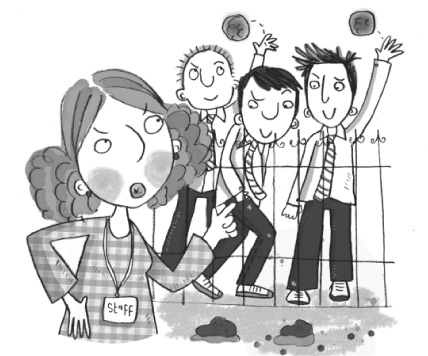
Then the High School crowd got bigger. Five or so Year Sevens and Eights became fifteen, the faces thinner and the bodies taller. The shouting voices were deeper and the sneers nastier. This was getting to be more than Mrs Smart could sort out by telling them that she knew their mums. She started telling the footballers to move back from the fence, but only a few listened and she walked, and then fast-walked and then waddle-ran up the steps and into the school building.
Nobody was interested in getting the ball back now. The bolder Year Sixes were pressed up against the wire of the fence, watching the numbers grow and smiling at the words of a chant that a few voices had started and then others had joined. Wasim had been first at the fence to get the ball back and he joined in the smiles and even started to join the chanting like the Year Six lads were doing.
“Oh, aye, lets go dashing,
We’ll go something bashing.”
He laughed along with the other older kids all around him, until they sang it again and he realised that the something was the P word. . . And that it was about fighting and beating people up.
Then he realised that all of the crowd that had walked down from the High School were white, and he also realised, while he was pushing his way back through the crowd, that his friends from his own school were still singing, even though they looked a bit embarrassed doing it.
Mrs Smart had made good time and Mr Abbott was on his way down the steps with his whistle in his mouth. He blasted it, but nobody took any notice, because now round the corner came more navy blue jackets from the High School.
But this time the people wearing them had dark skin and they were shouting just as loudly and walking just as fast.
The white faces pulled away from the fence and Mr Abbott’s whistle went mad sending his school indoors. They all wanted a last look to see what was going to happen.
Wasim looked harder than anyone else because he wanted to see if Atif was one of the brown faces that was lining up underneath the big school sign that said ‘Working together, growing together’.
“Come on, Wasim, there’s nothing to see here,” lied Mr Abbott, almost pushing him towards the building.
But Wasim wasn’t last. There was Gary Raynor. And he was looking at his brother, Lee Raynor, the owner of the loudest voice by the fence.
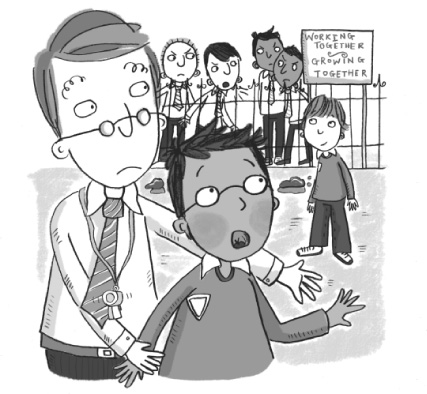
“Oh, aye, let’s go dashing. . .”
And Lee was looking right at Wasim.

Concentrating in class wasn’t what Wasim was best at, anyway, but with blue lights flashing in the playground and a distant voice on a loudspeaker talking about calming down, there was no chance of Wasim reading up to page fifteen as it said to in his reading record book.
Even Mrs Johns, the classroom assistant, was looking out of the window, and Mrs Scott was only pretending to focus on her guided reading group.
“It must be kicking off out there,” said Mrs Johns, and she got a look from Mrs Scott that was worse than one of the children would have been given.
Mrs Scott closed the blinds with another stare at Mrs Johns. Talk of ‘kicking off’ reminded Wasim about the football. He’d lost the form again and today was Wednesday – trouble outside or not, that form and that team had to be in.
He looked around and hissed to Charles, “Soccer Sixes form. . .”
Charles just lifted his shoulders in a shrug and carried on reading. That was strange – him reading instead of thinking about football. Wasim couldn’t risk getting caught because of football again, so he ticked that he’d finished his book and got up to swap.
“Miss, I’ve finished it, Miss. I’m swapping.”
“I hope that you can tell us all about it, young man.”
“Miss. . .” Wasim probably could. He’d had the same book, The Golden Key, in Year Three and Year Four, and he knew it off by heart. But he needed to get over to the book corner and see if someone else had a form he could fill in.
“Hmm.” He pretended to be interested in A Treasure Trove of Poems and saw that Gary was doing the same as him – he was pretending to put his name onto his reading record book, but when Mrs Scott turned back to her guided readers he was putting names onto the Soccer Sixes entry form and colouring in the kit diagram.
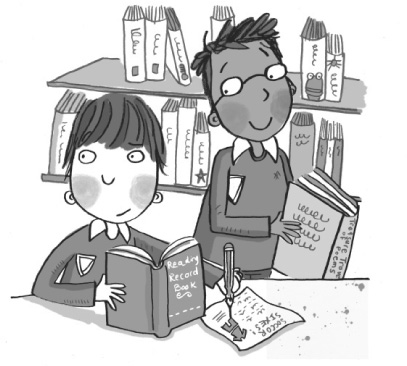
Wasim relaxed. Now Charles was filling in his name and the sheet was on its way to his table. He picked up his book and started back.
Mrs Scott turned round and the sheet disappeared under Charles’s desk.
“So, what did you choose, Wasim?”
“A book about pirates, Miss. . . Treasure and things. . .”
“Miss, it’s poems.” Donna was telling on him. “A Treasure Trove of Poems.”
Wasim sent her a glare. Trust Donna to show him up.
“Wasim, go to your proper blue bookshelf and choose a proper reading book.”
“But. . .”
Wasim watched the Soccer Sixes entry form disappear back into Charles’s tray and made his way out of the class, and down to the blue shelves in the corridor.
They weren’t really blue. The books just had blue stickers on and Wasim had read most of them. But he wasn’t allowed onto the greens yet, so blues it had to be.
There were three copies of The Golden Key there. He picked it again. Easy. He could read it out loud and nobody would know that reading in a language he didn’t even speak with his mum was hard.
And then he tiptoed past Mr Abbot’s office to try to get a look outside.
He knew he shouldn’t have risked it. The second that he passed the office door and was in a part of the school that children weren’t allowed to be in, the front door swung open and there was a gathering of serious people in suits: Mr Abbott, who held open the door for a policeman carrying a flat cap, Mrs . . . (Wasim couldn’t remember her name, but she was the Headteacher of Atif’s High School), another man in a dark suit and – in a grey kameez under his smart jacket – Uncle Zan!
Uncle Zan?
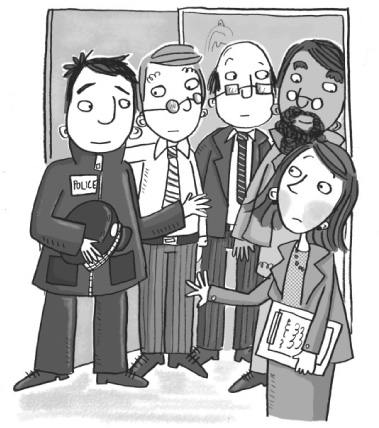
It was a bark from Mr Abbott. And Wasim went! He was back in class and reading The Golden Key again before he even took another breath.
Uncle Zan?

Afternoon play was cancelled so it was Connect Four, finishing off stories, a literacy sheet about words to describe an iceberg and flicking bits of paper at the back of your Maths book and pretending it was a goal. Wasim hadn’t finished the iceberg sheet, but he was more bothered about the entry form still in Charles’s tray.
Wasim burrowed deep into his pencil case and came out with the two pound coins that he needed. One for him and one for Atif.
He sauntered over to Red Group’s table, where Gary and Charles were busily colouring in the team shorts and socks. Wasim dived onto the table and slid to a skilful halt just where the main colouring was going on.
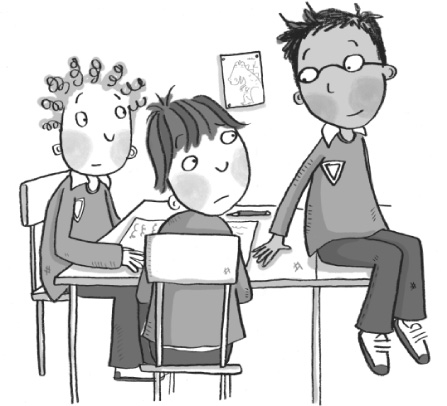
“Watch it, Ahmed. You nearly jogged me.”
“Soz. Got our quids.”
“What for?”
“Me and Atif. Rock Star Rovers. . .”
It went quiet. And Wasim suddenly felt that Red Table was enemy territory.
“Wasim Ahmed! Are you in bed?” It was Miss Pollitt, doing the indoor play rounds.
“No, Miss.”
And Wasim raised himself up and slid off the table in silence. He didn’t know if his face was burning and his throat was dry because of being told off . . . or because he might not be the quickest reader in the class, but he had made out the name Rock Star Whites instead of Rock Star Rovers and he would easily have been able to read Wasim and Atif. . . But they weren’t on that team sheet.
“His dad said,” was all Charles could shrug. “It wasn’t up to me. He had to choose . . . different mates. And Gary’s dad was giving them . . . us . . . white T-shirts, so they changed the name.”
But Wasim had walked off. The new name had nothing to do with the shirts.
Them and us. . . Even Charles. He wouldn’t have started it, but it was still them and us. Just like Mr Holloway said, only at least Mr Holloway had got to play in a match!
There was more them and us after school. There was a policeman standing outside the school. There was mud and litter and a broken bit of fence. And there were cars everywhere. Nobody was walking home.
Wasim was especially surprised when the policeman came straight for him and walked with him until they met Mum and Shamaila coming round from Class One and Dad coming right up the school drive to pick them up.
“Go home,” somebody shouted.
“We are going home,” said Shamaila.
Mum smiled a sad smile. “Yes, we are going home,” she said in English. And that was strange because when it was just them she normally spoke in Urdu.